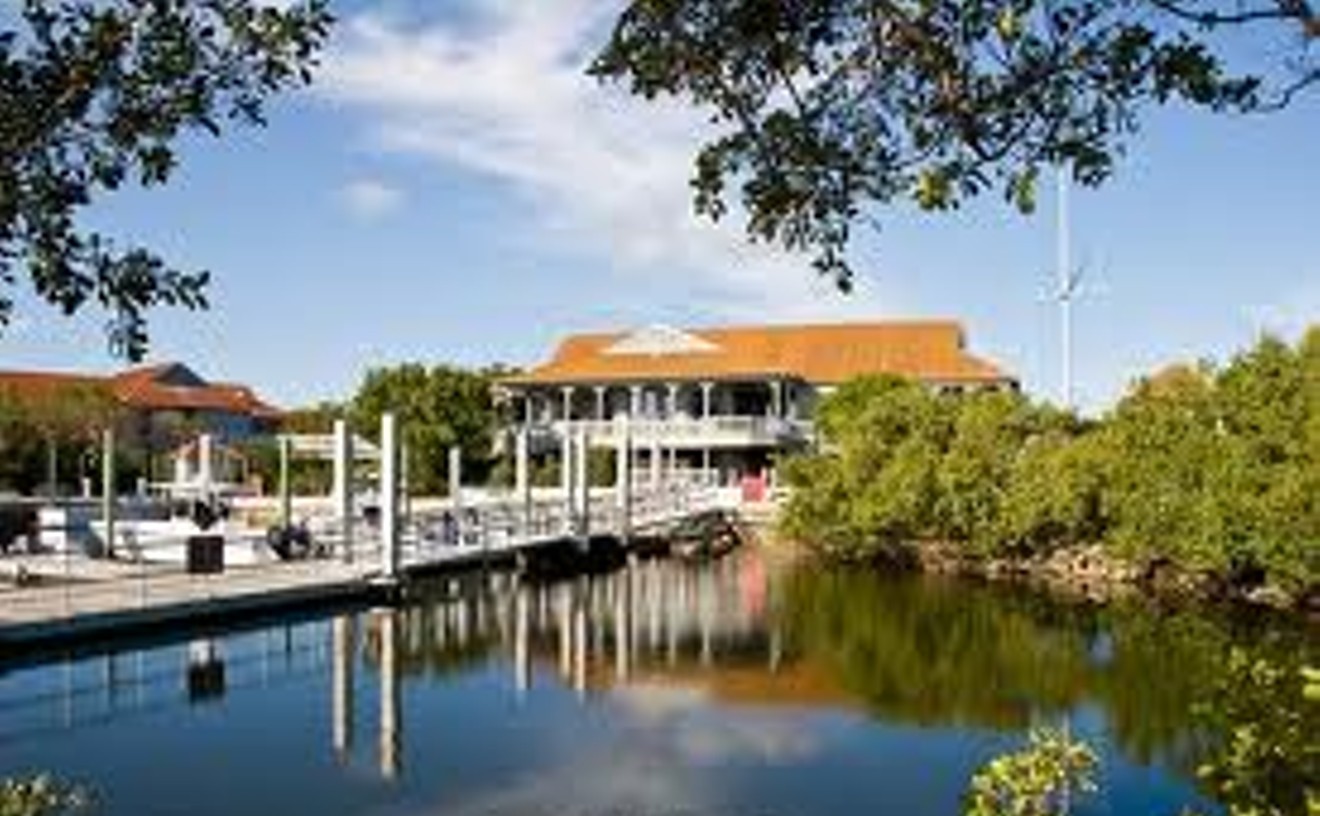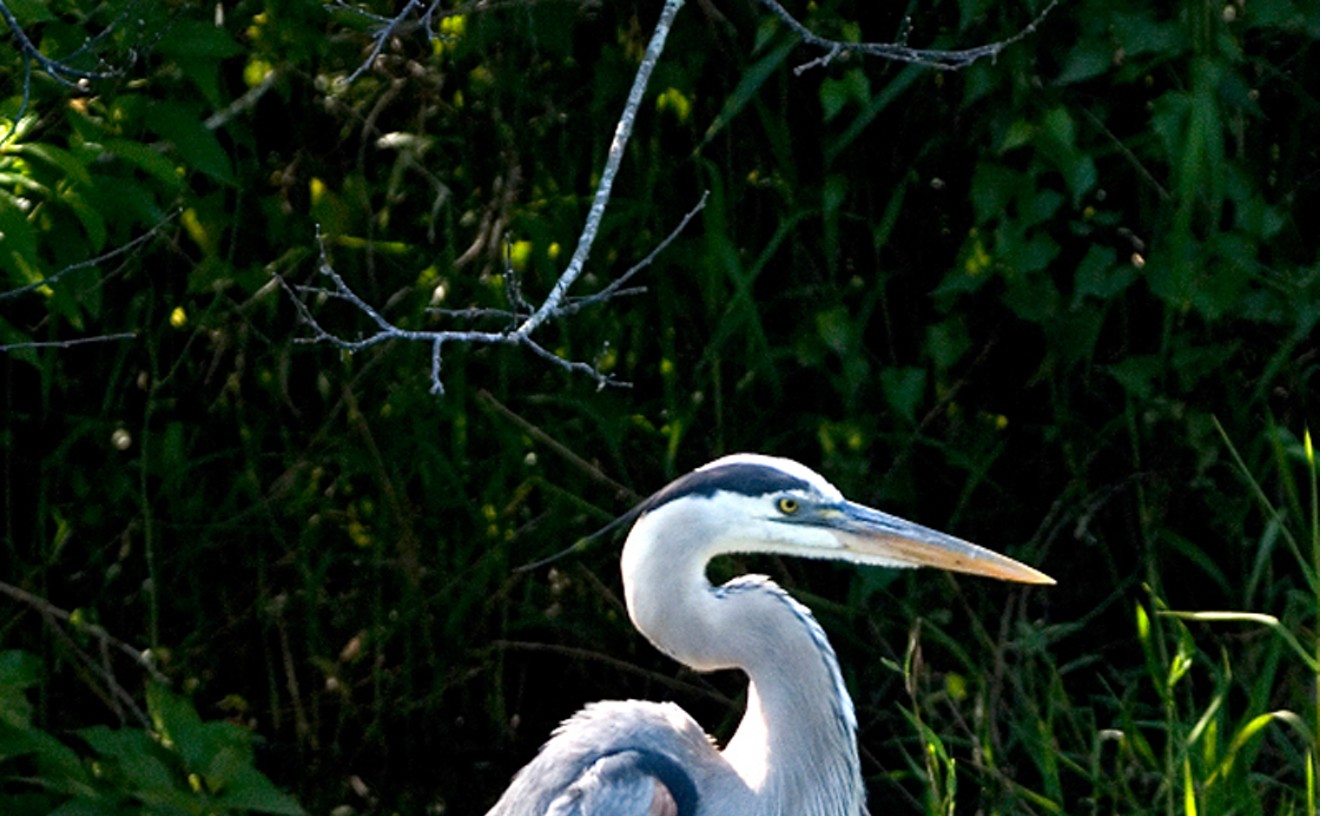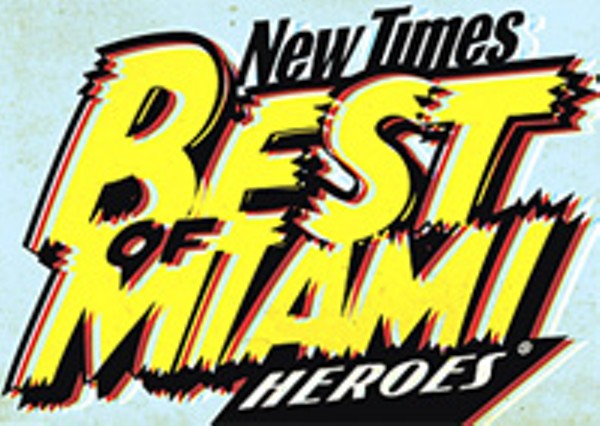He responds only to "Flash," and like the nickname implies, he is all about speed and light. Speed: to continually schedule a new and interesting slate of events, meetings, and benefit concerts. And light: to shed upon often overlooked issues that affect our city. The man who hides behind the mysterious nickname isn't the most gregarious dude, but his passion becomes immediately evident when he's asked about upcoming events at the Wallflower Gallery (10 NE Third St., Miami). Flash has worked hard to convert the downtown sanctuary from a funky spoken-word spot and art gallery into the epicenter of Miami's progressive, socially active hipsters. "If you check our MySpace calendar [at www.myspace.com/wallflowergallery], you'll see that we've scheduled a bunch of different series throughout the whole year now," he explains. "That includes a progressive vegetarian social the last Sunday of the month, and activist leadership training the first Sunday of the month. We're doing the Voice of the Voiceless meetings here on the third Sunday of the month, and I'm sure I'll come up with something to do on the second Sunday of the month sometime soon." Besides playing host to that dazzling array of events, Flash's gallery hosts Emerge Miami and regular Green Party meetings. The concept of upcoming Critical Mass events comes from here; recently the ragtag group of cyclists has successfully executed jaunts down South Dixie Highway, and has scheduled a trip through Calle Ocho. Flash is also the man behind the annual Everglades Awareness and Medical Marijuana Benefit concerts at Tobacco Road. Despite his seemingly superhuman efforts to bring creative minds together, raise awareness, and generate fundraising efforts for our local environmental causes, Flash remains modest about his efforts and reluctant to bask in the spotlight. "I'm just trying to keep the circus rolling," he demurs. More and more people are joining him every day.
Best Road Race for Runners
Nike Run Hit Remix
Nike is not an industry leader for nothing. They know what an athlete needs to get the job done. And let it be said that they were the first to recognize that if Rocky Balboa needed a little "Eye of the Tiger" to get him into the ring, then perhaps you and I might also improve our athleticism with a snappy little ditty to plod along to. With that in mind they created the annual Nike Run Hit Remix, which made its South Florida debut this past December. For a $30 fee competitors enter a five-mile run with legendary artists such as De la Soul performing live on temporary stages along the route. Last December's inaugural South Florida event drew almost 4000 participants to the starting line at the Miami Beach Convention Center. And thanks to the musical stylings of Nineties greats like Digital Underground, Young MC, Coolio, and Vanilla Ice, the majority also crossed the finish line on the sand at 22nd Street. "Yo, Adrian, we did it!"
Best Gadfly
Max Rameau
Before the April fire that burned Umoja Village to the ground, Max could be found grinning and holding his baby boy while sitting on a stained couch in the middle of the homeless shantytown in Liberty City. Part street theater, part protest, the place, which was Max's idea, opened this past October 23 on an abandoned lot on NW 62nd Street. Wooden pallet shacks on the site housed 40 homeless people; they all ate and relaxed in a common area. Inspired by the closing of the Scott Carver homes and the Miami Herald's excellent opus on the housing department scandal, Rameau created Umoja to shame local officials into creating affordable housing. And shame he has. The place was featured in every media outlet possible, from the New York Times to YouTube to Earth First! magazine. Al Sharpton visited (and donated $1000 to the effort), as did Pedro Hernandez, Miami's city manager (who contributed nothing but an annoyed smirk). Max's crowning achievement came during a glitzy week of shameless South Florida self-promotion during Super Bowl activities — when he bused in journalists for a reality tour of Umoja and the surrounding poverty-stricken neighborhoods. Fact is, Max has managed to get under the skin of local officials in a way that few activists ever have. Now that the village is destroyed, city leaders are finally listening to Max's ideas for putting affordable housing on the site — after, of course, arresting him for trying to rebuild the shantytown.
Best Place To Road Bike
Homestead

Road biking is a lot like driving. Same stretch of road, same rules. But unlike motor vehicles, which afford their navigators a steel cocoon behind which to hide in the event of a collision, cyclists have skin. It's preferable, therefore, to ride along quieter roads — where the likelihood of a door being swung open in your face, or a senile old woman backing her Lincoln Town Car out of her driveway without looking first — is minimal. So next time you feel the urge to click in your cleats and put power to the pedal, head to Homestead Bayfront Park. Entrance is free, so park the car and head west on SW 328th Street. The views are magical: mile after mile of undisturbed farmland, peppered with the odd truck here and there. Loop around the Homestead Speedway and, if your legs are up for it, head south down Card Sound Road toward Key Largo. And the best part: When you back get to the car thoroughly exhausted from your hazard-free trek, you can grab some much-needed grub from the snack bar. Better yet, if you planned ahead, you could throw a big fat juicy steak on one of the park's grills and really replenish what you just burned off.
- 9698 SW 328th St., Homestead, 33033 Map
- 305-230-3034
- miamidade.gov/parks/homestead-bayfront.asp
Best Urban Bike Ride
Both Sides of the Tracks tour

This ride will take you, both literally and figuratively, across the tracks for a taste of some of the uniqueness, diversity, and, at the same time, radical inequality that Miami has to offer. Start by the County Courthouse, on Flagler Street between West First and Miami avenues, in the heart of the city's gritty and endlessly fascinating downtown. You can head north on Miami Avenue to see the ghost-townlike buildings around NW Fourteenth Street, but if you don't like riding against traffic, take NE Second Avenue and cut back west at Seventeenth Street, where Miami Avenue opens to two-way traffic. Take Miami Avenue north into the freshly painted Design District. When you've had enough of that take any street east and continue north on NE First Avenue, a quiet, well-shaded, and very pretty little residential street. On NE 48th Street, hang a left, continue past Miami Avenue to NW Third Avenue, and begin heading back south, past some of Little Haiti's fine houses, churches, and shops. Third Avenue dead-ends at NW 30th Street — jog west and continue south on NW Fifth Avenue. Check out the quirky thrift shops, which sell everything from used tuxes to human hair. At NW 22nd Street, make a left and return to NW Third Avenue. Continue south right through the heart of historic — and woefully neglected — Overtown. At NW Seventh Street, head west to North River Drive, and take it the rest of your way south along Miami River. When you get back downtown, grab a bite at one of the many delicious hole-in-the-wall cafeterias — you've earned it!
- 73 W. Flagler St., Miami, 33130 Map
- 305-275-1155
- www.miami-dadeclerk.com
Best Young Environmentalists
Aspira
The Aspira Association is a national nonprofit dedicated to the education and leadership development of Puerto Rican (and other Latin) kids. Since 1961 the group has created programs to teach reading, math, and science; and increase educational resources, health, highway safety, and professional acumen. It's worked in the areas of language, economic development, arts, and culture, and has created a network of information centers and tangential organizations such as APEX (Aspira Parents for Excellence). All wonderful stuff. But worthy of special recognition are the group's recycling efforts, specifically Working Together for a Healthy Environment, a collaboration in early 2006 with Miami Dade College. Aspira also joined Keep North Miami Beautiful, an anti-litter initiative. Aspira is inspiring.
Best Miami Spokesman
Don Shula
When the South Florida Super Bowl XLI Host Committee needed a public face, its members didn't tap Gloria Estefan, Miami Mayor Manny Diaz, or rapper Rick Ross. Instead they went with the granite jaw, the legend: former Dolphins head coach Don Shula. The man is an icon in this city. For more than 30 years he manned the sidelines for the city's storied sports franchise, engineering a perfect season in 1972. But Shula is more than just a football coach. He is a man of great honor and integrity who still hasn't abandoned his down-to-earth-by-way-of-Cleveland persona. You're just as likely to run into him eating a slice at Gino's Pizza on Washington Avenue as you are at the United Way annual ball. And the 77-year-old steakhouse and hotel entrepreneur doesn't pull any punches, as evidenced by his stinging rebuke of recently departed Fins coach Nick Saban. Now if only someone could convince Shula to run for county mayor in 2008. Then maybe we could really have an inspiring leader.
Best Rural Bike Ride
Long Pine Key

Rodney Cammauf / National Park Service
After entering Everglades National Park through the Homestead entrance, Long Pine Key is pretty much the first stop in. It offers a maze of bike paths, ranging from 20-minute joy rides to half-day adventures. Between the Royal Palm Vistor Center and Pine Glades Lake is a mesh of trails that take you through sawgrass prairie, old farmland, and pineland. One of the longest rides is down Old Ingraham Highway, an abandoned, overgrown road that goes some ten miles out into the Glades and feels like a journey into Jurassic Park. Although it's possible to take a road bike out on these trails, a mountain bike is strongly recommended — as is a spare tube. Entrance to Everglades National Park is $10 per car (good for seven days), or $5 if you come by bike. An annual pass costs $25.
- 40001 State Road 9336, Homestead, 33034 Map
- 305-242-7700
- www.nps.gov/ever
Best Citizen
Bill Swink
For more than twenty years, Bill Swink has been known among Coconut Grove's homeless population as the "Soup and Sandwich Man." He serves food every Friday afternoon (around 2:00) at the Dinner Key Marina docks by the shrimp boats (3400 Pan American Dr., Miami). He drives up in his white car, pops open the trunk, and sets up his portable soup kitchen. "He is beloved in the Grove," says one anonymous Grovite. "He does not have to do this. Everyone else tries to push us out, but Bill really cares." "You have to survive out here, and I love helping people," says Bill, who works as a lawyer by day, "but I'm a small piece of the puzzle. The ladies at [St. Raymond's Catholic Church] cook the food. The quality is so good because they pay for most of it out of their own pockets." He continues, "There are homeless people in the Grove, but there are pockets of homeless people all over Miami. If people who read this could get motivated in their communities, it would be easy to replicate what I am doing." Bill stops for a second and takes off his glasses. "Publix donates the pastries and fruits; other stores donate food. It really becomes a labor of love."Indeed the soup and sandwiches are always delicious. There are also pastries, fruit, and beverages. When the food is eaten the group cleans up the area and loads the table and coolers back into Bill's car. "Everyone talks about this homeless problem, but Bill makes a real difference," says one woman who lives on a boat. "It is not that hard to treat other people like human beings, with respect. That could easily be you begging for spare change."
Best Road Race for Cyclists
SMART Ride
Two days, 165 miles, some of the most breathtaking views Florida has to offer. Celebrating its fourth year, the SMART ride — the southernmost HIV/AIDS ride — though not technically a race, attracts hundreds of particpants annually. Approximately 500 cyclists gathered this past March 30 at the starting line in Pinecrest. Each paid a $75 entrance fee and raised at least an additional $1200 to compete. Their combined efforts raised more than $1 million, which was donated to six area AIDS-related charities. And though the event doesn't offer a medal for first place or a purse for the fastest time, riders get to test their physical limitations for a much-needed cause. The ride is fully supported, meaning there are manned rest stops along the way with food and drinks, and a support team that trails the group, providing technical assistance to those in need and picking up stragglers who may be unable to complete the course. Those who do make it to the finish line in Key West are invited to a catered party in their honor on Duval Street.





